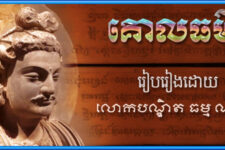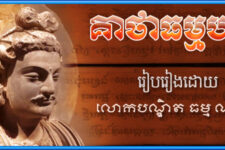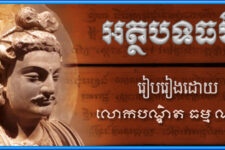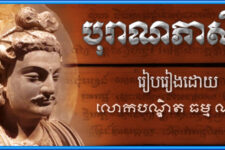ពុទ្ធវចនៈក្នុងធម្មបទ គាថាទី ១៦
អ្នកធ្វើអំពើល្អ រមែងរីករាយក្នុងលោកទាំងពីរ
HAPPY ARE THE WELL-DOERS HERE AND HEREAFTER
इध मोदति पेच्च मोदति, कतपुञ्ञो उभयत्थ मोदति।
सो मोदति सो पमोदति, दिस्वा कम्मविसुद्धिमत्तनो॥ (តួអក្សរទេវនាគរី)
ឥធ មោទតិ បេច្ច មោទតិ, កតបុញ្ញោ ឧភយត្ថ មោទតិ;
សោ មោទតិ សោ បមោទតិ, ទិស្វា កម្មវិសុទ្ធិមត្តនោ ។
អ្នកធ្វើបុណ្យទុក រមែងរីករាយក្នុងលោកនេះនិងលោកខាងមុខ រីករាយក្នុងភពទាំងពីរ ។
គេរីករាយប្រមោទ្យ ព្រោះរលឹកនឹកឃើញអំពើបរិសុទ្ធស្អាតរបស់ខ្លួន ។
Idha modati pecca modati, katapuñño ubhayattha modati;
So modati so pamodati, disvā kammavisuddhimattano.
Here he rejoices, hereafter he rejoices. In both states the well-doer rejoices. He rejoices, exceedingly rejoices, perceiving the purity of his own deeds.
—————————————–
Story: រឿងធម្មិកឧបាសក
A devout person, named Dhammika, who led a religious life, lying on his death-bed,(1) saw happy visions, and after a peaceful death, was born in a celestial plane.(2)
—————————————–
(1) According to Buddhism the subsequent birth is determined by the thought process at the moment of death.
(2) Buddhists do not believe that the earth is the only habitable plane and that human beings are the only beings. Planes are numerous and beings are innumerable.
After death one may be born as a human being or in a subhuman state or in a celestial plane according to one’s actions. The so-called being in the subsequent life is neither the same as its predecessor (as it has changed) nor absolutely different (as it is the identical stream of life). Buddhism denies an identical being but affirms an identity in process.
—————————————-
Source: Dhammapada: yamaka vagga; 16th gāthā,
translated with brief stories by Nārada Thera (2522-1978)
ប្រែពីបាឡីជាភាសាខ្មែរដោយ តាអារាមប៊យ ២៩.៧.២០១៩




